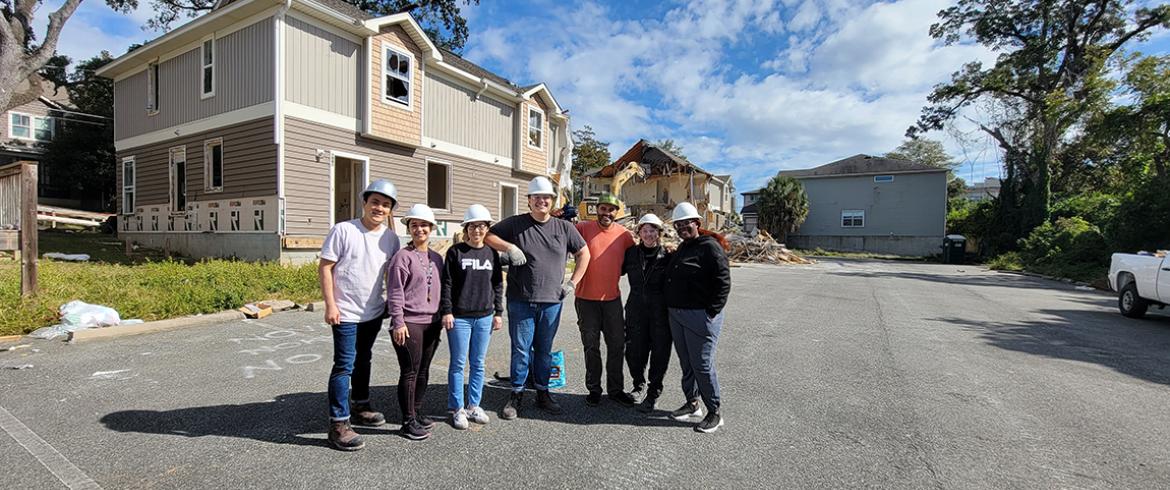
L to R) Juyeong Choi (CEE, assistant professor), Maral Nazemi (CEE, student), Qian Zhang (CEE, assistant professor), Alexander Laubach (Art, student), Rob Duarte (Art, associate professor), Grace Thornburg (Art, student), and Donte Woodget (CEE, student). (Courtesy Choi)
The building industry is one of the largest consumers of raw materials and producers of waste in the United States, according to the U.S. Department of Energy and over 90% of demolition waste is recyclable or reusable. So, why aren’t we recycling these materials?

Juyeong Choi, an assistant professor in civil and environmental engineering and researcher at the FAMU-FSU College of Engineering, thinks there are many issues, including public perception about construction debris and the need for more knowledge in the industry. Educating a new generation of engineers about sustainability practices related to demolition operations may be the key.
“We are involved in a new study that brings multiple universities and students of different age groups together to understand how we can be more sustainable when it comes to demolition waste,” Choi said. “We are especially committed to leveraging the talent pool of underresoureced students from our HBCU institutions into the field.”
Choi is leading the study backed by the U.S. Environmental Protection Agency that focuses on a system of initiatives. At the college level, undergraduates enrolled in construction materials courses will have the unique opportunity to participate in sustainability challenges.
“In addition to the competition challenges, we are integrating sustainable demolition practices in the actual curriculum,” Choi said. “Several faculties are involved in developing course modules related to sustainable demolition operations and planning.”
Choi invited students from five institutions to training workshops to get the skills they need for this growing industry, including African American and Hispanic students from Florida A&M University and Florida International University. They will have the chance to learn about recycling and reusing materials and how to develop data methodology and use new, more sustainable materials.
Another initiative engages younger students by showing them how to reuse and recycle building waste, which can become beautiful and artistic.
“We plan to collect structural waste from regional demolition sites for an upcoming event where we will work together with middle school students to transform these materials into beautiful art crafts,” Choi said. “Engineering and art students are taking a leadership role in the event. They are facilitating workshops with the young students, guiding them in the creative repurposing of materials. While the focus is not on teaching the formal principles of recycling and reuse, we believe that through the artistic transformation of these end-of-life materials, the students will discover the inherent value in otherwise discarded materials. Ultimately, the students will create arts and crafts from the material to showcase at an outreach event for the public.”
WHY IT MATTERS:
Many studies have identified the prevalence of the negative public perception of demolition waste as the primary impediment, which can be due to the lack of education about and awareness of its potential and benefits. The project aims to instill in students and the public a positive attitude toward demolition waste and educate the next generation of engineers to make more sustainable decisions.
WHO’S INVOLVED:
Choi works with faculty and undergraduate students from five universities, including Florida State University, Florida International University, Iowa State University, Kennesaw State University, and the Georgia Institute of Technology.
WHERE’S THE MONEY COMING FROM:
The U.S. EPA funds the $134,078 study through Florida A&M University. The project is part of the EPA’s Education Grants Program, over $3.1 million to support minority-serving institution environmental projects nationwide.
RELATED ARTICLES
J. Choi, Ph.D. selected for as Fellow in NSF Enabling Program
Using Data to Enable Post-Disaster Debris Reuse and Recycling at the Community Level and Beyond
